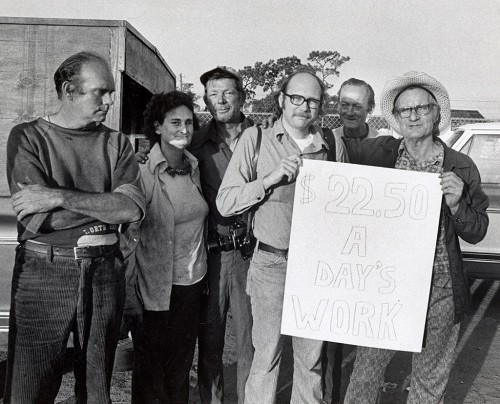Labor Day got me to thinking about this photo of farm workers on strike in Immokalee, Florida. I spent a lot of time covering migrant farm workers in South Florida and had gotten to know this crew well enough that I talked them into taking a reporter and me into the fields with them.
I spent the day shooting photos and trying to avoid being shot by the farm owner (fortunately for me, the guy’s wife liked me well enough to intervene). My partner spent the day picking peppers. He was paid $18 for a day’s work: $17 of it in cash, and a buck withheld for Social Security by the crew chief. Whether that buck ever made it to Washington is a matter of conjecture. My buddy said, “When I retire, the very first dollar I spend is going to be the dollar I earned picking peppers.”
Not long after that, I went back to Immokalee to cover the workers striking for their pay to be raised from $18 a day to $22.50 a day. The strike was unsuccessful.
I am, if you haven’t guessed, the guy with a camera over his shoulder.


Curiosity has me – which farmer was it? I taught in the migrant farm housing nin Immokalee. Jim knew many of the farmers because he was tracking feeding wood storks. Some were friendly and others were not!
I have long since forgotten whose farm we were on. We probably mentioned his name in the story. I had been there several hours trying to stay as low-key as possible when a truck pulled up to pick up a load of peppers. Turned out it was the farmer’s wife at the wheel. We started talking and hit it off fairly well.
Not long after that, I saw a cloud of dust and a pickup skidded in where I was standing. The farmer was NOT happy to see a photographer in his field. Once his wife got him calmed down, we had a good conversation and he turned out to be a nice enough guy. It was good to get his perspective.
Most folks are pretty reasonable if you make it clear that you’re wanting to tell all sides of the story and that you don’t have preconceived ideas. (OK, I’ll admit that sometimes I WOULD have a preconceived idea, but I was always willing to change that viewpoint if I was wrong.)
As I pointed out in my other story, the villain is us – the folks who want our produce at a low price.
The small farmer’s not getting rich; the people in the fields certainly aren’t getting rich; the landlords renting rooms to the workers aren’t getting rich; the Border Patrol guy says, “Hey, I’m just trying to enforce the laws passed by the people you elected; the stockade warden says, “I just house the ‘wetbacks’ until the bus comes to deport them…”
If I run across the name, I’ll email it to you.
Yes, it is a pretty sick system. And what we get from it are tomatoes bioengineered to last a long time on trucks and grocery store shelves and to look like tomatoes even if they taste like nylon. (Sorry if you were talking about peppers, but Florida is the nylon tomato capitol of the world.)
If we could just get away from partisanship and the myth of American exceptionalism and ask why tomatoes don’t taste as good as they did when we were kids, we might find out a few things about what we have done to ourselves that maybe we should rethink.
They write whole cookbooks about this stuff.